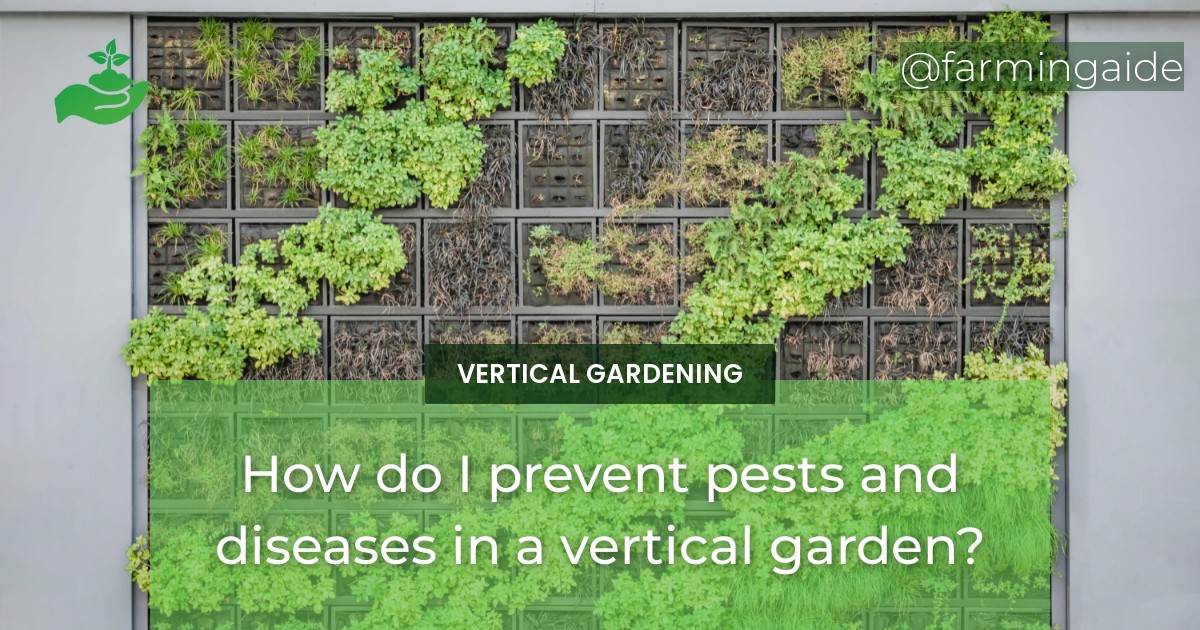Vertical gardening is a great way to grow plants when you have limited space. However, it can be challenging to prevent pests and diseases in vertical gardens. In this article, we’ll provide you with effective pest and disease prevention techniques that will keep your plants healthy and thriving.
Pest Control Methods for Vertical Gardens
There are several ways to control pests in vertical gardens without resorting to harmful chemicals that can affect the environment and your health. Here are some natural pest control methods:
Natural Repellents
Planting strong-smelling herbs such as mint, lavender, and rosemary can help repel pests. They can also attract beneficial insects that eat harmful pests.
Beneficial Insects
Introducing beneficial insects such as ladybugs, lacewings, and praying mantises can help control pests in your vertical garden. They prey on aphids, spider mites, and whiteflies, among other pests.
Chemical-Free Solutions
You can use organic solutions such as horticultural oils, insecticidal soaps, and diatomaceous earth to control pests in your vertical garden. These solutions are safe for humans, pets, and beneficial insects.
Disease Prevention Techniques
Diseases can quickly spread in vertical gardens if you don’t take the necessary precautions. Here are some disease prevention techniques:
Proper Plant Selection
Choose disease-resistant plants that are suitable for your climate and growing conditions. Avoid planting weak or stressed plants, as they are more susceptible to diseases.
Regular Maintenance
Inspect your plants regularly for signs of disease. Remove any infected leaves or plants immediately. Water your plants in the morning to prevent excess moisture, which can lead to fungal diseases.
Hygiene and Sanitation
Clean your gardening tools and containers regularly to prevent the spread of diseases. Use sterilized soil and compost to avoid introducing pathogens to your vertical garden.
ALSO READ
Natural Remedies for Common Garden Issues
Several natural remedies can help treat common garden issues in your vertical garden:
Neem Oil for Fungal Diseases
- Mix neem oil with water and spray it on your plants to prevent fungal diseases such as powdery mildew and black spot.
Garlic Spray for Insect Infestations
- Mince garlic and soak it in mineral oil for a day. Mix the garlic oil with water and spray it on your plants to control insect infestations.
Soap Spray for Pest Control
- Mix a few drops of dish soap with water and spray it on your plants to deter pests such as aphids and spider mites.
What Measures Can I Take to Prevent Pests and Diseases in a Vertical Garden?
When it comes to vertical gardening maintenance tips, prevention is key. Inspect plants regularly for signs of pests or diseases, and remove any affected foliage immediately. Keep the garden clean and tidy, and avoid overwatering, as excessive moisture can lead to mold and mildew outbreaks. Finally, consider using natural pest control methods such as beneficial insects or companion planting.
Other Considerations for Pest and Disease Prevention
Here are some additional considerations to keep in mind:
Proper Watering Techniques
Water your plants at their base and avoid getting the leaves wet, as excess moisture can lead to fungal diseases.
Air Circulation
Good air circulation can help prevent fungal diseases and keep pests at bay. Avoid overcrowding your plants and prune them regularly.
Monitoring and Early Detection
Inspect your plants regularly for signs of pests and diseases. The earlier you detect a problem, the easier it is to solve it.
By following these pest and disease prevention techniques and using natural remedies, you can keep your vertical garden healthy and thriving. Remember to monitor your plants regularly and take action as soon as you notice any issues.
RELATED ARTICLES:


